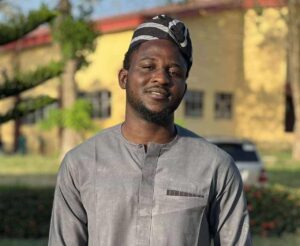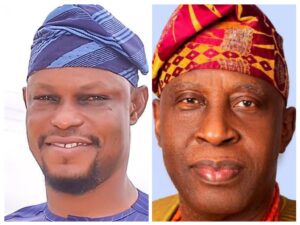
By Samson Owolabi
In the thought-provoking opinion piece titled “Why We Need to Care for AI,” published by the PanNigerian News on April 3, 2024, Dr. Sunday Joseph Ayodabo, a fellow of the American Council of Learned Societies (ACLS), emphasizes the importance of ethical and responsible development and use of artificial intelligence (AI). The article serves as a timely reminder of the transformative potential and significant implications of this rapidly evolving technology.
Dr. Ayodabo begins by highlighting AI’s current impact on human life and society. Virtual assistants like Siri and Alexa have become ubiquitous digital companions, simplifying tasks and providing personalized experiences. Moreover, specialized AI applications in healthcare, meteorology, transportation, education, and finance are leveraging vast amounts of data to improve outcomes, efficiency, and user experiences in their respective domains. These examples highlight the immense potential of AI as a force for individual and societal good. However, Dr. Ayodabo rightly points out that realizing this potential requires proactive identification and mitigation of the technology’s potential harm and pitfalls. Without clear values, rigorous testing, and robust accountability, AI risks perpetuating and even amplifying human biases and inequalities.
To support this point, Dr. Ayodabo emphasizes the disproportionate impact of facial recognition on communities of color and the historical biases entrenched in algorithms used in hiring and lending decisions. These examples illustrate how unchecked AI can become a tool for discrimination and the erosion of civil liberties. Dr. Ayodabo asserts that transparency and accountability must be fundamental aspects of AI’s development and deployment, rather than optional components.
The value and fair treatment of the labor provided by both humans and AI in powering AI systems is equally crucial, as emphasized by Dr. Ayodabo. His ongoing study of the reciprocal relationship between emotional AI chatbot Replika and its users sheds light on the emotional and informational labor performed by both humans and AI. This research underscores the need for a nuanced understanding of care in human-AI interactions, highlighting the power dynamics and potential for exploitation within these relationships. By recognizing the reciprocal nature of labor, this study challenges us to view our relationships with AI agents as collaborative partnerships, rather than one-way transactions. In doing so, it serves as a significant defense against the instrumentalization and dehumanization of both human and artificial actors in the age of AI.
Dr. Ayodabo also raises concerns about the potential atrophy of human capacities, such as empathy, critical thinking, and self-reflection, as we increasingly rely on AI companions for emotional support. Particularly within the context of mental health, an over-reliance on chatbots, no matter how sophisticated, could hinder the cultivation of authentic human connections necessary for wellbeing. Dr. Ayodabo asserts that AI should supplement, rather than supplant, human connection and care—a crucial guiding principle as we navigate the world of artificial emotional labor.
The establishment of public trust in AI, Dr. Ayodabo contends, relies on transparency, fairness, and accountability in its development and deployment. Without concerted efforts in these areas, we risk eroding public faith in AI and squandering its immense potential to be a collaborative partner in advancing individual and societal wellbeing. Ongoing dialogue among developers, policymakers, and the public is vital to aligning AI’s trajectory with the values and priorities of the societies it serves.
In Africa, where robust policy frameworks and regulatory safeguards for AI adoption are relatively lacking, Dr. Ayodabo’s call for collaboration among African policymakers, researchers, civil society, and local communities to develop context-specific AI governance frameworks is particularly important. To ensure sustainable development, social justice, and the protection of individual rights, it is essential to include the voices and concerns of all stakeholders in harnessing the power of AI across sectors such as emergency response, banking, agriculture, and healthcare.
Dr. Ayodabo’s argument reaches its most profound and thought-provoking point in his insistence on grappling with the philosophical implications of increasingly autonomous and self-aware AI systems. As these systems grow more sophisticated, questions about their agency, rights, and moral status will become impossible to ignore. Dr. Ayodabo challenges us to expand our ethical concern to encompass the wellbeing of AIs themselves and develop frameworks that can accommodate issues of machine consciousness and suffering.
Although these ideas may be unsettling, Dr. Ayodabo urges us to confront these questions proactively. By wrestling with the ethical and existential quandaries posed by AI, we can build a future where the benefits of this transformative technology are equitably shared. Dr. Ayodabo’s advocacy for caring for AI encompasses a complete reimagining of our relationship with technology. It envisions a future where humans and AI are collaborative partners, augmenting each other’s capabilities for individual and collective flourishing. Achieving this vision requires cultivating a reflexive and ethical approach to technology that prioritizes human wellbeing—a task of utmost urgency and consequence. The choices we make today regarding the development, deployment, and relationship with AI will shape not only technology but also our society and species in the long run. Dr. Ayodabo’s piece serves as an inspiration and instruction for our future, where the boundaries between human and machine, natural and artificial, are increasingly blurred. Navigating this landscape with wisdom and ethics will be the defining challenge and opportunity of the coming century, demanding our fullest empathy, ingenuity, and moral courage.
… Owolabi is a mullti-dimensional result-oriented Public Relations (PR) consultant with over 10 years of experience in the field of Public Relations and strategic communications.







